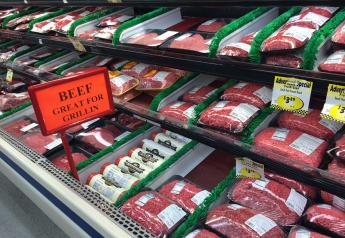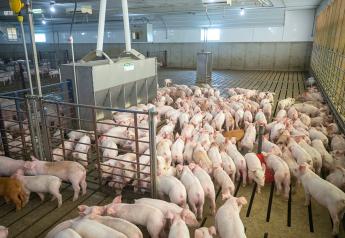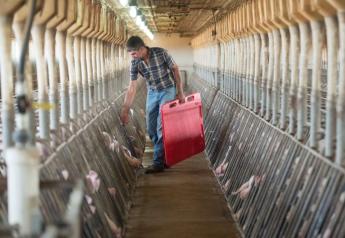Rural Revival: Why 3 Pig Farmers’ Wives Quit Teaching and Bought a Coffee Truck
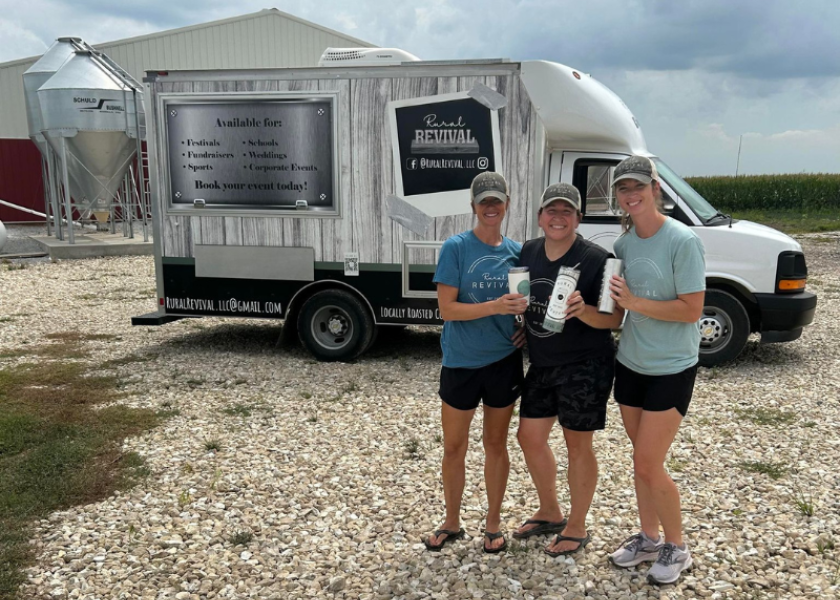
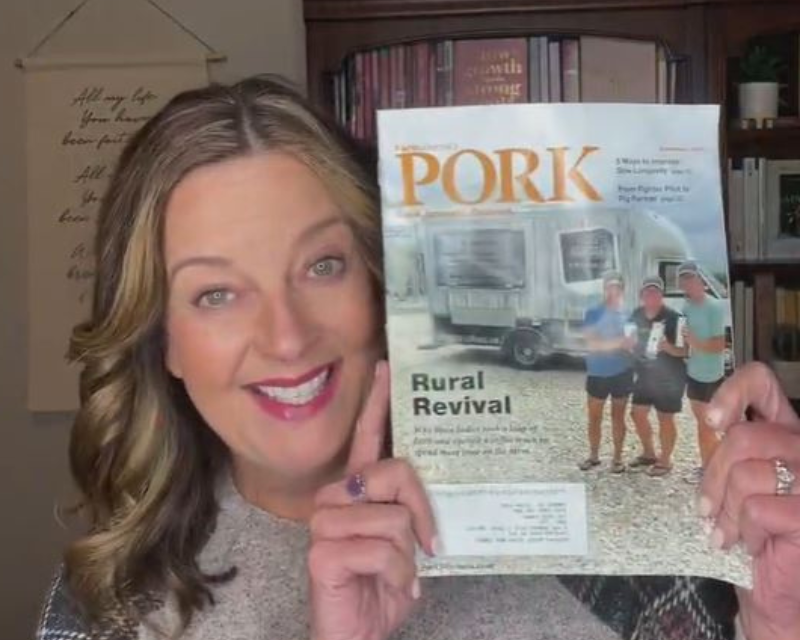 Story Update: The Rural Revival coffee truck owners and farm wives, Naomi Gretter, Kari Berg and Sky Hahn, recently joined Jennifer Dukes Lee, the author of the book that changed the course of their lives, on Instagram Live.
Story Update: The Rural Revival coffee truck owners and farm wives, Naomi Gretter, Kari Berg and Sky Hahn, recently joined Jennifer Dukes Lee, the author of the book that changed the course of their lives, on Instagram Live.
As the recent cover story of Farm Journal’s PORK magazine hitting mailboxes across the U.S., Gretter, Berg and Hahn had the opportunity to share their story once again!
Watch the full video below:
“If you’re going to rise, you might as well shine.”
There’s no question it took a leap of faith for three Iowa elementary school teachers to quit their jobs to open up a coffee truck in southeast Iowa in the spring of 2022.
Undeniably Naomi Gretter, Kari Berg and Sky Hahn had a lot in common. They were teachers, and good ones at that. Their husbands raised pigs and farmed in Washington and Keokuk counties. They were busy moms caught up in the “crazy life.” But baristas? Not really. They couldn’t even make a latte.
Still, Naomi Gretter of Harper, Iowa, couldn’t shake the idea of starting up a coffee truck. She felt like she needed a change from teaching second grade...that there was something more.
Coincidentally, a friend gave her the book, “Growing Slow,” by Jennifer Dukes Lee. Gretter says it opened her eyes to the burnout and stress that had become her normal mode of life. It challenged her to control that. So, after she finished the book, she passed it on to Berg.
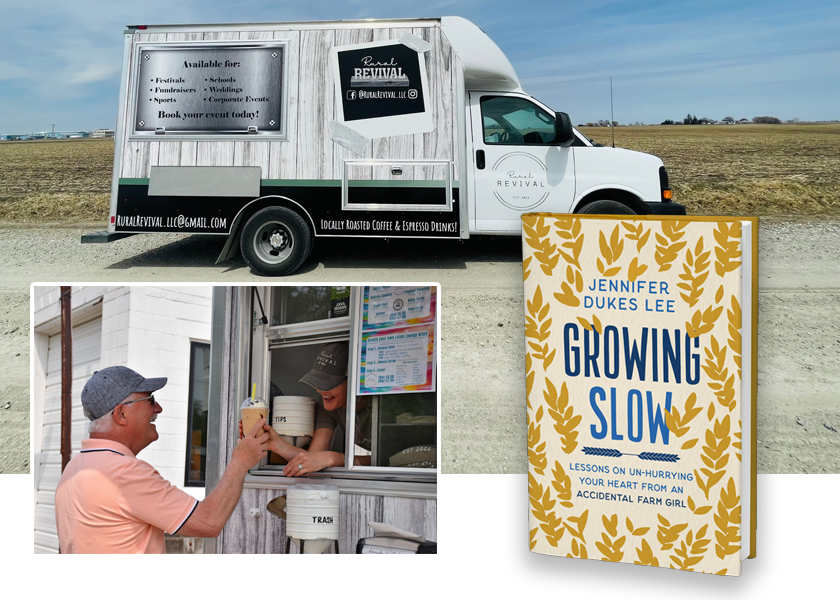
“I was like, ‘Wow,’” says Berg of Harper, Iowa, who was teaching preschool at the time. “Life is so short. If you are just going through the motions, it’s not worth it. We need to enjoy our families and enjoy what we do every day.”
A Good Slowdown
As farm wives and teachers, their lives were filled with a lot of unknowns when it came to their schedules. Having a full-time job outside of the home made it hard to manage a healthy home and life balance being married to a farmer with a random schedule creates another variable, Gretter adds.
“We were living that crazy life: put kids in car in the morning, get them to a babysitter, go to work all day, get kids from babysitter, go home and then it’s anyone’s guess about where you’ll end up,” Berg says. “Are you delivering food to the field? Are you helping do this chore in the barn? It was always so hectic and we needed a slowdown.”
Gretter didn’t give up on the coffee truck idea and approached Berg in her classroom in the fall of 2021 and said, “I am serious. This could be a really good slowdown for us.”
It wasn’t long before they saw Hahn sitting in her fourth-grade classroom after returning from maternity leave later that fall and it hit them both that she was living a similar life with a farmer husband, three kids and trying to manage and balance it all.
“I had a 3-month-old and two older kiddos at the time,” says Sky Hahn of Keota, Iowa. “I felt like I was checking off the boxes every night: get supper, get baths, help kids do homework and things like that.”
Gretter and Berg passed Hahn the book and the rest is history.
“We thought it was going to be a harder sell to our husbands, but they loved the idea and immediately started helping us,” Berg says.
The Rural Revival coffee truck idea was in full force.
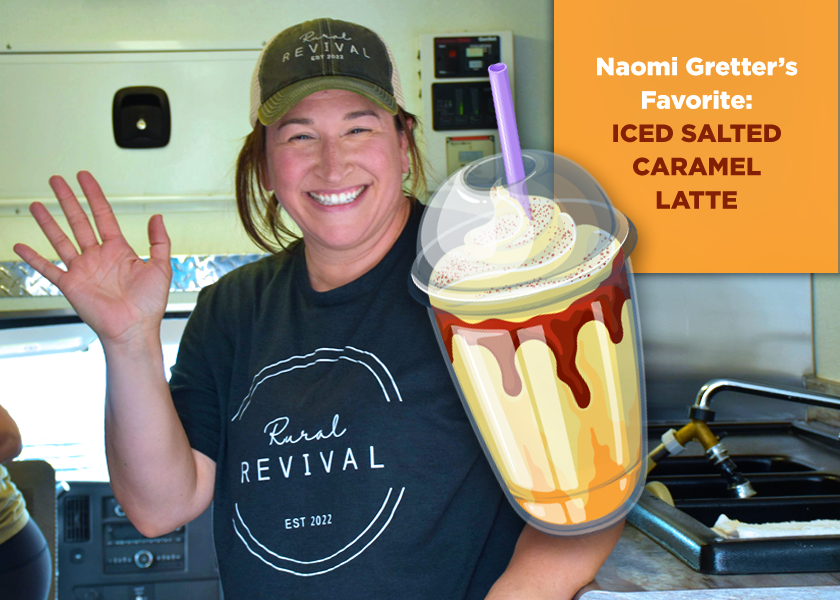
Running on Coffee and Grace
During a snowstorm in February 2022, the three couples set out for South Carolina to see about buying a truck. They drove straight there and didn’t sleep a bit, Berg says. At first, they weren’t sure if they could afford this “turnkey” option that had previously been known as “The Rolling Roast,” but after talking with the owner, they knew it was the right move.
“All we had to do was rewrap it. Plus, the guy selling it was wonderful,” Berg explains. “We started to tell him our story and our situation. We let him know what we could offer him, and he backed down on the price because he felt like we were going to do great things with the truck.”
In fact, he was so on board that he even gave them a crash course in being a barista.
“Boy, that espresso machine was my enemy for a while,” Berg says. “I did not like it one bit. It was like grounds in the face every time. But practice makes progress, and I realized you can learn anything if you’re willing to stick to something.”
In addition to using the equipment, they had to find a coffee source to make their dream a reality. They partnered with Java House in North Liberty, Iowa. Not only were they incredibly helpful, but they fit with the Rural Revival focus, Hahn says.
“It was important to us to get our coffee from local sources,” Hahn says. “We are supporting an Iowa business and couldn’t ask for a better partner.”
On April 20, 2022, Rural Revival opened for business complete with a “Runs on Coffee and Grace” sign on the truck, a list of creative coffee drinks, a bunch of big dreams and a wide-open schedule that filled up fast as people began trying their coffee. In fact, word made it out fast enough that United Animal Health hired them to set up at World Pork Expo in 2022, and they will be back again in 2023.
“Last year at WPX, we were brand new. We are so excited for this year and appreciate United’s support and confidence last year,” Berg says. “It also feels good to fill a need on something that’s hard to find at WPX. Plus, it’s an event that interests our husbands, too.”
It’s also fun to meet people from all over the world, Hahn adds. She enjoyed listening to their stories and seeing them try Rural Revival’s coffee.
“Last year someone from another country told us this was the best coffee he’s had in the United States,” Gretter laughs. “Now, we don't know how many spots he has tried in the U.S., but he sure loved the double-shot espresso.”
A Balancing Act
Coming from a small, rural community and teaching at the same school made it easy to get an idea of what it would be like to work with each other, Gretter says. Between Berg’s “get it done” force, Gretter’s organizational prowess and Hahn’s captivating charisma on social media, they were able to get things rolling.
“Naomi has everything perfectly listed in the truck on how to do things. You can tell she’s a teacher too because she color coded everything,” Berg laughs. “You go up to the window and she even has a step-by-step guide on how to order a latte.”
They divvy up the duties, including the mundane tasks. At the end of the day, they all depend on and need each other in different ways, Berg says.

Their synergy is undeniable. Lots of laughter and tears are shed in the back of that truck as they grow their business and do life together. Hahn says it doesn’t hurt that their lives are similar, and they share similar expectations.
“We are farming families. We all know the importance of being flexible and going with the flow. We understand that sometimes you take on things you didn’t expect you’d have to do. That makes it easier for us to adapt and switch gears,” Hahn says.
The hardest part of owning a coffee truck together is scheduling, Gretter says. It’s a lot of people, pigs and acres to balance out.
“We have to ask ourselves often, is it worth the added stress of taking on another event? If we add one more this week, is that the best thing for our lives?” Gretter points out.
When they were just getting started, Berg felt bad about saying no, but she soon realized what was good for business might not always be the best for their families. She says it’s much easier now to say, “Darn, I wish we could, but honestly it just doesn’t work for us at that time. Maybe next year.”
It All Works Out
Coffee trucks and pig farming may not appear to match up at first. But Berg points out it’s a great combination because coffee truck gigs don’t typically take the whole day, outside of events like a county fair.
“Just this morning, Sky was up at 6 a.m. doing weaning. She had time to do that before meeting us for the launch of our new summer drinks today,” Berg explains. “With this type of business, we aren't out all day. If we need to go help on the farm, we can.”
The Berg family operates a 30,000-head finishing operation. The Gretters have two 2,400-head wean-to-finish sheds. The Hahns are part of a family farrow-to-finish operation. They farrow 350 sows and then send the weaning pigs to family members to finish.
They all agree they couldn’t make the coffee truck work without family and a supportive community.
“Rural Revival has helped shine a light on our little rural town of Keota. We get so excited when new businesses bring new people in to showcase our community,” says Shauna Sieren, a Keota native. “We love to support Rural Revival. They, in turn, help support our youth and our schools. Plus, who doesn’t like a great cup of coffee?”
Although their presence is certainly missed in the schools, Berg says when one door closes, another one opens. New teachers have taken their place that are doing great things in the schools.
“Everything happens for a reason,” she says.
Her farm was recently struck by a tornado that destroyed two finishers, one nursery full of pigs, a machine shed and equipment, multiple grain bins, one house and damage to the other house.
“I wasn't able to pick up the shifts and different jobs I was supposed to do for the coffee truck. But these girls didn't even hesitate. They didn't allow me to go to work at all,” Berg says. “They were like, ‘No, you're going to stay home and help your husband.’ It’s pretty incredible to work with friends like that.”
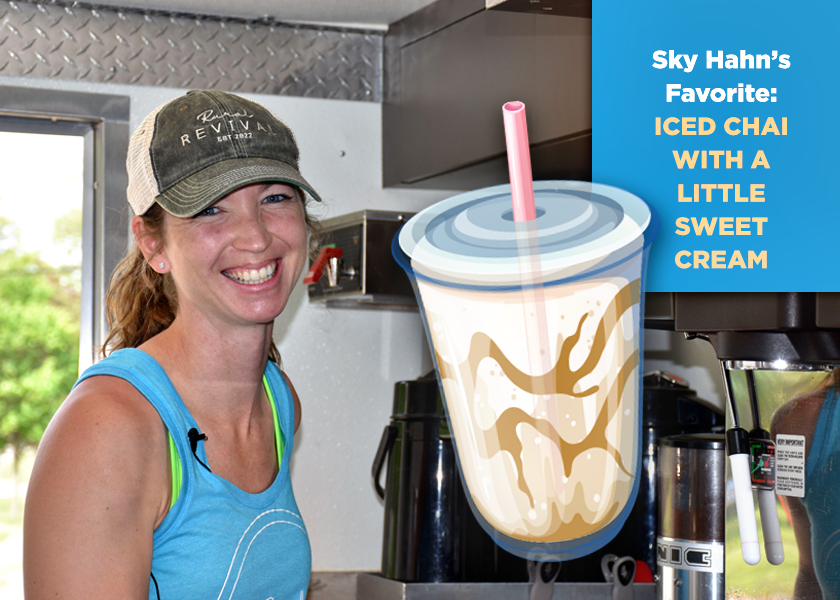
What Does Slow Growth Look Like?
The other day while Hahn was attending a field trip, one of the moms told her that her daughter wants to be a barista when she’s older.
“Just the thought of kids even thinking about ‘oh I could do that’ is overwhelming,” Hahn says. “I never imagined what we’re doing could help open up non-conventional career paths or encourage others to create their own happiness.”
That’s exactly what Berg hopes they are doing – spreading happiness...in a cup.
“It's the little things that matter,” Berg says. “If you can start your day with something a little exciting, it makes the rest of your day a little bit more enjoyable. Being able to provide that for the people around us and seeing their happiness is fulfilling. There’s no sadness here.”
Gretter says opening a coffee truck has taught her a lot about herself, too. She’s learned it’s okay not to know all the answers.
“We’re still teachers at heart,” Gretter says. “We’re always learning things. If we don’t know it yet, we can figure it out or ask for help.”
Where do they see themselves in five years? For Hahn, it’s doing what they are doing now.
“I feel like we've got a grasp on our expectations and have cut out what doesn't fit the lifestyle that we want,” Hahn says. “It's hard to grow slow. When you get that free time, you feel like you need to fill it. I think the continued challenge of growth is enjoying that free time and quietness. You don't have to fill it and that's okay.”
Read More:
Pork Producers Provide Perspective for Lawmakers
Girl on Fire: Paizlee Hardin’s Return to the Show Ring
Want to Drive Pork Demand? Fish Where the Fish Are
What’s Top of Mind for Swine Veterinarians in 2023?
5 Ways to Attract Youth to the Pork Industry
Pork Producers Face a Bleak Profitability Picture
The 'Unfunded Mandate' and Three Perplexing Realities Of Prop 12


